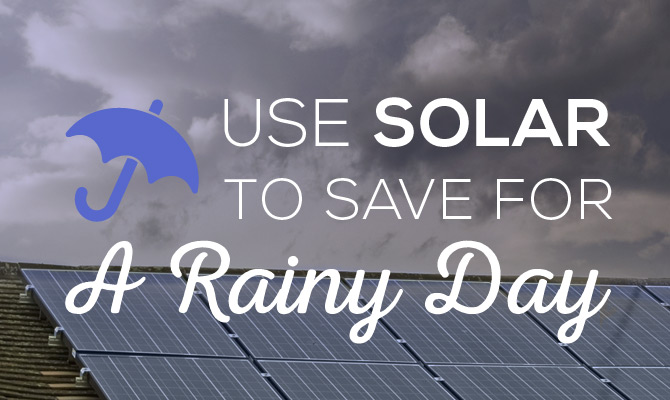
Many people think of solar panels as a direct source of electricity for the home. As long as the sun is shining, the lights will stay on. So what happens when the sun goes down or dips behind the clouds? How well do solar panels hold up over those long harsh winters and spring storms? Is going solar more hassle than it’s actually worth?
Shady Solar Panels
When cloudy days roll in, solar panels are not able to generate as much energy as they do on bright sunny days. Overnight, solar panels go into standby mode and do not generate any electricity at all. Massachusetts homeowners have two options when the sun isn’t shining and the solar panels are not able to cover the household’s electrical needs.
1. Battery Backup. Whenever your solar panels generate excess energy, batteries can be added to your arrangement to store that energy. That way, your home can draw from the batteries during the evening hours or other times when your solar panels cannot keep up. Batteries are particularly helpful during a blackout, but they do have a limit to how much energy can be stored.
2. Net Metering. When you are connected to a net meter, the electric company rolls the meter in one direction when you are drawing power from the main grid. When you are generating your own power or excess energy, the meter remains stagnant and can even spin backward!
If you end up generating more electricity than you’ve used overall, you will get a credit on your electric bill that can be used toward a future bill. Using this method, you may be able to rack up credits during long summer days that can be used to offset the costs of long winter nights.
Weathering the Storm
If you consider that solar panels need to be free from all obstructions to generate energy, they also must be left wide open to wind, rain, snow, ice, and everything else that Massachusetts weather can throw their way. With nothing up on the roof to protect your solar panels, you might be wondering if they will last long enough to make them a worthwhile investment. In actuality, snow will melt off of your solar panels. Once your panels are clean, and surrounding snow can actually reflect more light onto the panels.
The Energy Department’s National Renewable Energy Laboratory published a report in early 2015 that studied the outcome of 50,000 solar systems that were installed between 2009 and 2013. Their findings were very reassuring: in spite of hurricanes, hail storms, and even a few cases of vandalism, only 0.1% of the systems were affected by any damage. In other words, like the U.S. Postal Service, rain or shine, snow or sleet, they will deliver your power.
The Price of Maintenance
Many companies that lease solar panels to residential customers claim that the free maintenance they provide will offset the slightly higher overall cost of renting instead of buying panels. The National Renewable Energy Laboratory would have to disagree. The same study found that less than 1% of the 50,000 solar systems studied had hardware problems and that the overall annual degradation–or the rate at which the panels decline in performance due to age–was between 0.5% and 1% each year.
Armed with this information, it is easy to see why people choose to purchase solar panels for their home. You can store up unused power for a rainy day and expect decades of reliable output from your investment.








